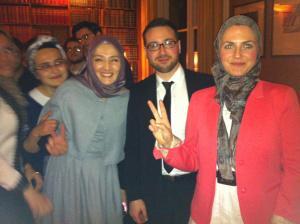

This is the transcript of the debate I (and my team) won at the Oxford Union on Thursday 23rd of May, 2014, opposing the motion: “This House Believes Islam Is Incompatible with Gender Equality”
Final results: 166 opposition, 51 proposition
Ladies and gentleman, I’m here with you this evening to oppose this motion because I believe my faith, Islam, is underpinned by a core principle of justice, which necessarily implies the full equality of men and women. Moreover I urge you to think carefully about the infantilising and frankly patronising implications of suggesting that Muslim women just don’t really know what’s good for them.
But the significance of this topic and your recognition that it is entirely legitimate and coherent to be both a Muslim, a practitioner of Islam, and to believe the faith is not only compatible with gender equality, but fundamentally demands it, is far bigger than my personal, particularly privileged position on the issue.
I’d like to draw your attention to the story of the little known activists doing the hard graft on the ground. Khatoon Shaikh is a campaigner from one of India’s slums who, despite her lack of formal education, decided to challenge injustices she saw meted out to women. She did this by establishing a sharia court, which reclaims Islamic texts through a feminist perspective, challenging prevailing patriarchy in the justice system and demanding gender parity. For her, like for millions of women worldwide, Islam is an ethical framework of reference through which to affirm their absolute equality with men.
As a Muslim feminist, I’m acutely aware of the struggle over authority and meaning within Islam. As Muslims, we can’t control who interprets the faith or how. But we can call people out for inconsistencies between the proclaimed authenticity of their interpretation, and the very sources they claim to derive their legitimacy from.
I could have spent this entire speech highlighting ways in which the Quran seeks to affirm the equality of men and women, but one simple saying by Prophet Mohamed (pbuh), who is referred to as the embodiment of the Quran, sums it up: “Certainly, women are the equals of men, whomever honours them is honorable, and whomever disdains them is worthy of disdain” (Imam Ahmad).
What you’ve unknowingly stepped into via this debate is a struggle over religious authority in Islam and who actually gets to speak for ‘Islam’. Really what supporting this motion would mean is validating those with the power to assert their sexist interpretations – in other words, upholding the view that those, predominantly men in power, somehow get to define Islam, and this, typically at the expense of women.
What you may not be aware of, is an ongoing struggle by a movement of Islamic reformists, for the re-insertion of women’s voices. Religious literalists uphold the idea that they alone have the authority to dictate to women where they belong and that usually is not far from the stove.
But many other Muslims, male and female would dispute their religious authority, pointing to empowering precedents of Muslim female leaders, businesswomen, scholars, activists, judges from Islam’s inception onwards. What is often missing in discussions about the very real injustices experienced by some Muslim women is a profound and nuanced understanding of the intersecting circles of oppression they experience, and the consequent impact on Muslim women’s ability to define the faith.
After all, how in the face of illiteracy, is a woman meant to become a religious leader? How can Muslim women assume positions of political authority within the context of widespread political dictatorships, which are themselves a form of neo-patriarchy?
Like many Muslim feminists, I spend a significant portion of my life unpicking the presumed truism that Islam promotes gender inequality, both among some of my co-religionists and within broader society. I am a feminist because I recognize there is a problem with misogyny in all societies and I’m a Muslim feminist because I firmly believe that my faith, Islam, is inherently egalitarian.
It never ceases to amaze how much overlap can be found between the position of religious puritanicals and those who try and claim Islam is inherently misogynistic. In many ways, the positions are co-dependent, since the assumption that sexist interpretations represent an authentic reflection of the faith, is critical to the argument that Islam is inherently misogynistic.
The problem is, such a position only really emboldens the sexism, it only serves to confirm the perception of puritanicals that they, alone, reflect a true vision of the faith and that those of us who refer to example of Prophet Mohamed as a pioneering feminist – who insisted on women’s education, religious authority and tied the very notion of piety to the just treatment of women – are either naïve or just plain deluded.
I have no doubt that today the proposition will pull out decontextualized verses from the Quran and herald them as a damning indictment of Islam’s inherent misogyny. What I would urge you to do is not fall into the trap of thinking that sacred texts are books from which random excerpts can be pulled and the significance of which is seemingly obvious. Let me assure you that is not the case.
The Quran is a context specific set of revelations which cannot be read without due consideration of the higher objective of any given injunction. There is good reason theology is an actual academic discipline – it requires years of study to understand how practitioners of a faith approach their textual sources and one does a huge disservice to religion by claiming anyone can pick up the Quran and understand what is intended by the text.
Similarly, I’m sure Iran or Saudi Arabia will be touted as examples of Islam’s inherent inequity towards women, but the question does pose itself – Who says that the pseudo religious practises of a given state actually represent the most authentic reflection of Islamic theology? In fact, the entrenched sexism institutionalised in these countries has far more to do with political interests and literalist interpretation, than with careful consideration of a faith which, in its earliest incarnation, sought to radically reverse the deep misogyny of a society which buried its daughters alive and treated women as chattel.
Back in the 7th century when it was revealed, Islam instated a new set of values according to which women have inalienable rights, among them the right to choose your spouse, the right to divorce, to earn your own money, to take on public including political roles, to inherit and much more. But above all else, Islam brought a message of fundamental human equality.
You will rightfully ask, if Islam has given women such clearly defined rights and established their fundamental equality, why do so many Muslim communities reflect such inequities between the sexes. The truth is there is no simple answer. Certainly, the marginalisation of female voices within Islamic scholarship historically has given men free reign to institutionalise their authority and cement it through the construction of religious legitimation.
The consequence is a body of scholarship which perpetuates male privilege and a political body which justifies its discriminatory practices through reference to those same texts.
But to locate the root of women’s unequal treatment in religion, is to minimise the very real multifaceted struggles women face –poverty, famine, disease, illiteracy, violence, occupation, war. In other words, claiming Islam is to blame for women’s oppression is to be essentially blind to “intersectionality” namely to the impact of the interrelated systems of race, gender, class, ethnicity, etc.
Support for today’s motion equates to denying women agency in defining their faith and rejecting the legitimacy of their struggles for equality expressed through paradigms which are meaningful to them.
You might aswell suggest that the Taliban extremists who shot Muslim educational activist, Malala (Yousafzai) are actually the true representatives of Islam. Such neat binaries which present religion as the source of all evil fail to recognize the value of religion to millions around the world and its transformative potential, sometimes for bad, but often also for good.
To quote the Iranian Muslim Nobel peace prize winner, Shirin Ebadi: “An interpretation of Islam that is in harmony with equality and democracy is an authentic expression of faith. It is not religion that binds women, but the selective dictates of those who wish them cloistered.”
To support this motion is to lend credence to the likes of Boko Haram in Nigeria who kidnap young girls and claim their education is a sin, rather than recognising the vast majority of Nigerian Muslims who demand justice for women because of their faith, not despite it.
Illustrating this is the largest ever study of Muslim public opinion globally by Gallup, which indicates that religiosity does not actually correlate with less egalitarian views towards women, but rather that in the majority of countries, men who support women’s rights were actually found to be more religious.
What opposing this motion is truly about is recognising that there is no one-size-fits-all call for gender equality. What there should be is a recognition of the myriad ways in which women express their full emancipation, and sufficient respect for the intellect and integrity of Muslim women to recognize that they are not passive victims of their religion, but active combatants in reclaiming its true nature.
I’m asking you to oppose this motion because the struggle for gender equality is not the struggle of white, secular middle class feminists – it is a struggle for justice and humanity which innumerable devout Muslims around the world are involved in every day. By failing to acknowledge the legitimacy of their voices in the struggle against gender oppression, by marginalising those who articulate gender equality in terms other than our own, we only ultimately succeed in weakening the struggle for gender equality itself.
Islam isn’t just compatible with gender equality, it is a meaningful articulation of the full humanity of women for millions around the world. I urge you to oppose this motion.
Thank you.
